Without Ice and Fire, what was "Game of Thrones" about? (Spoilers)
A few days have passed since the grand finale of "Game of Thrones", which is why it is worth asking yourself - what exactly was this game about. The post of course contains spoilers.
It seems to me that the phenomenon of "Game of Thrones" is primarily the fact that it was based on a book narrative. And that means that the material from which screenwriters drew out went far beyond what usually arises in the heads of series authors. Martin - regardless of whether it was the cause of his success or prolonged creative impotence - he drew his world very widely, populating it with numerous and diverse heroes and heroines. For this he benefited from the thread, at least from Tolkien's time, the end of a certain era and certain times. The coming winter is above all a sign of changes towards which the heroes actions seem small and sometimes secondary. It is the time of the collapse of the old order, the fulfillment of the prophecy, the return of such magical elements as long-forgotten dragons. The world on the verge of a great breakthrough is a favorite theme of fantasy artists who played perfectly on the screen. The closer the Night King was to the wall and hence the political scuffles at Westeros, the more they seemed meaningless. Who would sit on the iron throne when the world is ending.
The problem is that Martin's idea - however incredibly intriguing and involving in the long run, put the screenwriters in front of a difficult task. Not only because the writer did not write the last volumes. Also because the creators had to decide at some point whether they write a series about the history of the end of a certain world or - according to the title - write about "Game of Thrones" and how political and private conflicts imprint on heroes. Martin's idea best reflects the title of his cycle - 'A Song of Ice and Fire' pointing to a story that goes beyond one conflict, referring to those stories that are sang in songs many centuries later. What is before our eyes was supposed to become for centuries only a memory of heroic deeds. Such a design of Martin allowed him to definitely have more fictional freedom. Life of individuals - it was not necessarily so important in the face of the change that was happening around them. The speeding wheel of the political dispute seemed to be just one of the cogs of the great machine of change. As long as the writers were following Martin's trail, anything could happen because in a world where everything needs to be re-evaluated anything can happen.
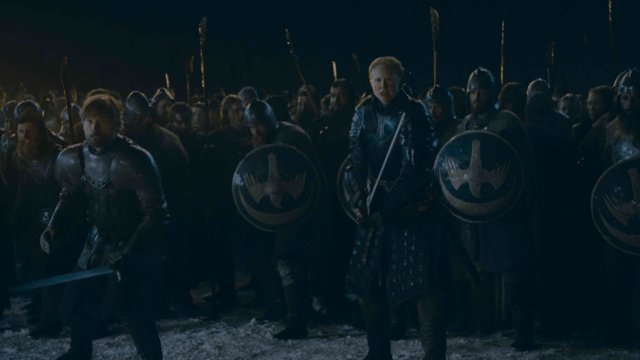
At the moment when the writers took over narrative after Martin, they decided to focus on the title "Game of Thrones". Dispersed all over the world, the protagonists began to move to one point. What is clear, if the main conflict is to be the one in which the most important are individuals and their ambitions, then they can not all function in separate parts of the world. Because now the world and its inevitable changes are becoming a hero here but individual people along with their aspirations. This decision is not necessarily bad in itself. It seems that the screenwriters of the series bet on what they know better. Writing characters who face more or less obvious choices. The problem is that in the first seasons following the vision of Martin, the creators remained with a specific burden of great things that they could not dump. The vision of the approaching winter, the army of the undead, the evil coming from behind the wall - all this was perfectly inscribed in the history of the changing world, where the endless winter is coming. The threat grew there as apocalyptic as around us - quietly, stubbornly, on the verge of consciousness of the rulers. At the same time, the great threat beyond the political scuffles has awakened the viewer's hopes. The series seemed to suggest that there would be something more important than the Iron Throne, which at one point seemed to be more of a gadget than a real symbol of power.
The last season perfectly shows how much screenwriters could not cope with this compulsory production dichotomy. On the one hand - confrontation with the Night King proved to be too simple and too obvious. Instead of showing the power ready to spread the known world to pieces, we got the final battle with global warming. What's more - the one from which the heroes must come out victorious and in one piece - because they are needed by screenwriters to conduct a political narrative much closer to their heart. The moment the screenwriters cut off the thread of this declining history, a threat overgrowing ordinary political arguments, the show had to be redefined quite quickly. After all, it was supposed to be primarily a story about people. And actually about those people we met in the first season. The fact that they were so closely related to the first season in the last episodes of the creator seems symptomatic. This reference is supposed to confirm us that the theme of the series was the path of heroes - and fulfilling - or not - the fate that fate gave them.
Looking at what ultimately happened to Stark’s it is not hard to see that the screenwriters refer primarily to the ambitions and destiny of the heroes who were burdened at the beginning. Jon Snow returns to the Nights Watch, as he was written. From the point of view of character development, this is a good move - although at the same time - the hero's real identity is something redundant in this context. Jon Snow did not have to be a chosen one or Targaryen to finish where he finished. And here again this conflict is visible - Jon's identity is needed in Martin's narrative - where the conflict is written out much wider, in a humble TV series he is in addition. Sansa gets something she has always dreamed about, Bran as the oldest male descendant of Stark becomes king, here again does not matter his role as a three-eyed crow, or the possibility of transferring consciousness. These are necessary elements in Martin's world and completely unnecessary in the history of TV screenwriters. Arya fulfills her destiny without surrendering to the pressure of society. At the very end the series tries to convince us that from the very beginning it was about the fate of the Stark's siblings. Which is not necessarily true - or rather - which was not necessarily true before the last season.
At the same time, wanting to concentrate the political dispute over the dilemmas of the siblings from the north, production pushes aside the figures that seem - from the point of view of political intrigue much more interesting. Cersei and Daenerys never have the opportunity to meet, although their characters are equally interesting and in some respects equally indispensable. Ultimately, the writers decide to kill both heroes in such a classic way - each of them is lost in the arms of a beloved man. Which, in turn, would be interesting to consider in the context of how women in power and their romantic relationships are seen. Please note that there is a kind of narrative that suggests that a woman in power can never really love anyone, because then - falling in love becomes in some way subordinate to a man, which means that he has power. To some extent, you can find some confirmation of such thinking in history (where, after all, the rulers who ruled without husbands are distinguished) but at the same time there is something sad about the fact that only a happy ending gets Sansa. Sansa which - as she admits herself, after the writers words - was shaped by other men who were tormenting her, manipulating her and raping her. In other words - a woman who trusts a man will die, one who can not be broken by men can rule. I have a problem with these threads, especially since after all one of the biggest advantages of the series was that it created definitely more interesting female characters than male. But at the same time - one can come to the conclusion that they are arranged like this because again - what is important here is playing with the mechanisms of power, rather than trying to reflect us with the order of the world.
Exactly - the last episode - written rather perversely wants to make us realize that nothing really happened. Iron throne was destroyed and the dragon flew away somewhere but the great change of the world, which was to let the events of the first season's move, eventually turned out to be a political movement. Of course, the way of choosing the king changed a bit, and the land of the north regained independence, but no one moved the capital, the political system only got a slight correction and the representatives of those families who sat there earlier still sit at the tables. Deanerys, which sounds like a copy from the textbook of tyrannical revolutionary talks, is shown here as a tyrant whose revolutionary slogans about change are to become a new tool of oppression. A profound change in how the world works is impossible, because it involves imposing some other vision - whether people want it or not. In some respects, screenwriters reject here not only visions that ”Game of Thrones” could tell about the end of the world but also about any revolution. There is a sad conservative message in it that the world should actually stay in the same place in which it lasted - even if it comes out of them after years of bloody conflict. What, again, could still be saved as a perverse punch line were it not for the fact that Martin, with his ideas and creation of the world, awakened hope in us for something more. For what? This is a difficult feeling to describe, but everyone knows it - it appears in our hearts when one reads the scene about Elves swimming away from Middle-earth. When you know that the war may be over, nothing will ever be the same. We came to the end of the era and got the shortcut of the European Hundred Years War.
Interestingly, the writers faced the problem of an excessive amount of characters to some extent. The heroes whose role in the great conflict extended to several continents made sense, now became to some extent onerous ballast. Some supporting characters almost disappear, some have only half written threads. Because folding the story took no less than its development, it often happened at the expense of side characters. This is perfectly evident on the example of characters such as Sam and Brienne, who from the heroes who were given a lot of screen time turned into a form whose role is absolutely secondary - because it is known that they will not sit on the Iron Throne. Tormund characters are completely unnecessary, and Bron appears in three scenes throughout the season. It can not be done otherwise because Martin creating an epic saga could add characters, and screenwriters want to talk about a small conflict in total (eventually fight three families) must either kill heroes (which they do not like because they are not writers) or significantly reduce their threads. What makes this season seem incredibly careless and sometimes written halfway.
The creators cleaned up and patched up their vision of the conflict so as to remove everything that was not political, not human, but just such a final and magical one. When the dragon flies off far away, taking Deanerys body, he really takes with him the last element of the world's magic - the one tossed there by Martin. All that remains is a battlefield of political game. The roles are distributed - the creators did not undertake to write any new characters, so deaths had to stop. The heroes as a reward that they have lived so long get their ending, in this not necessarily altered world. Stark's children close their destiny. Everything seems to be good, because the end has in itself and hope, and a buckle and a bit of understatement. Only that this is the end of a different story than the one we've been watching for years. Interesting stories, God forbid to say something bad about it, but a very nice costume that differs from a fragment of political history in Europe. Apparently, TV screenwriters could not do what partly determined the success of ”Game of Thrones” - write a fantasy series. Because you must have more imagination for this. And this is what the imagination did not do at the end of the story. And so the story that could tell quite a bit about today's world remained suspended between the writer's fantasy and the scriptwriter's thinking pattern.
If only I had to sum up what happened to the ”Game of Thrones”, only the metaphor of the wolves comes to me. They appear at the beginning of the story and it seems that these almost forgotten creatures that Ned Stark's children receive will play a vital role. Both in the novel and in the series they play a smaller and smaller role. No less in the novel, they still have their meaning - they are for something. In the series, the creators have never found a place for them. Apart from the Ghost - Jon Snow’s wolf, no other was left on the show for a long time. Something that predicted these times of the end of the world, this not only some political but also climatic and magical transformation, dissolved into the narrative. When at the end of the last episode Jon Snow returns to the castle of the Night Watch and meets his beloved wolf with a broken ear, the Ghost is no longer a symbol of all these magical prophecies, symbols and almost forgotten rules of the world. Ghost is just a faithful dog, who is waiting for scratch the ears before going on the way. And so it is with the show, the elements of the fantastic world scattered throughout the series were in fact nothing but significant trinkets. If they were not there from the beginning, the screenwriters might have done better, but following the path of Martin all the time they awakened hope.
Yes, I'm a fan of ”Game of Thrones”, the ending don't hurt me. I feel that the creators wanted to break the scheme of the knightly epic and on the last straight hero who bears all the marks of the one who receives the power of this power does not get. It hits his brother moving on a wheelchair. But at the same time - Bran fits into another dream of a ruler. The only ones that Hollywood agrees with. A ruler can be a ruler only if he does not want power unless he needs it. Apparently, the creators try to be perverse but ultimately remain in the same frame. Playing for the Throne makes sense only if there is no Throne or anyone who wants to sit down with all his heart. The question whether the series, who abandoned his great ambitions, managed to say anything new about the nature of people, power and the impact of political fights on the world. It seems to me that the screenwriters ultimately failed. The series fails because it did not say anything new, it did not open any new perspectives of our view of the world. The profession does not follow from the fact that the characters finished differently than we would like, but from the fact that we are returning from Westeros surprisingly the same (though slightly older) as we entered it. And it was going to be winter and change everything. Meanwhile, we got a bit of a parable about the corruption of power, with the addition of an American need to reflect on whether or not to limit the privileges of a hereditary monarchy.
Ultimately, ”Game of Thrones” really changed this belief about the possibilities offered by television - especially in the context of a fantastic story. There was no TV series with such a high budget and such a high production level. From season to season the performance we were offered became more and more indistinguishable from what can be seen in films with a huge budget. In the last season there were scenes moving with their beauty and panache, such as the meeting of Jon and Dragon under the ruins of Kings Landing, a scene so beautiful that it allows you to forget about all the plot holes in the story. This will be the real legacy of the ”Game of Thrones”, which will probably be followed soon by the Amazon series based on unused stories from Middle-earth. This and one more. Whenever we hear "You know nothing" we will be adding "Jon Snow" to the end of our days.
Ps. One thing is for sure, Martin's vision and screenwriters do not coincide. What makes me wait with great curiosity for the moment when Martin announces the end of his saga. I wonder if he knows how to tell such a started story to the end. Perhaps this is a story that has only a good beginning. We've seen so many of them before.
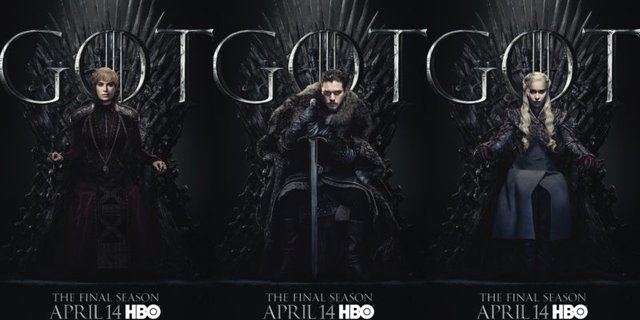
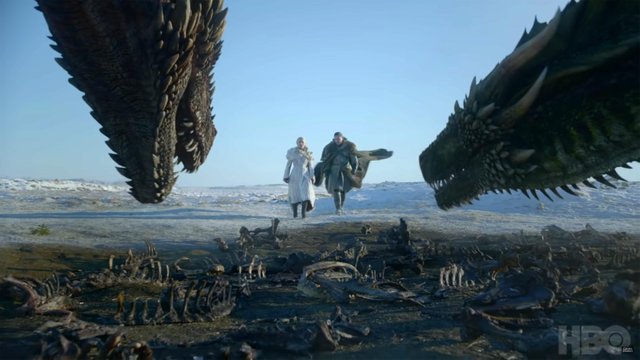
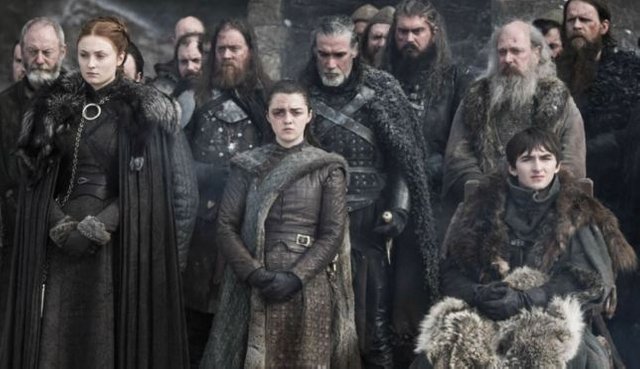
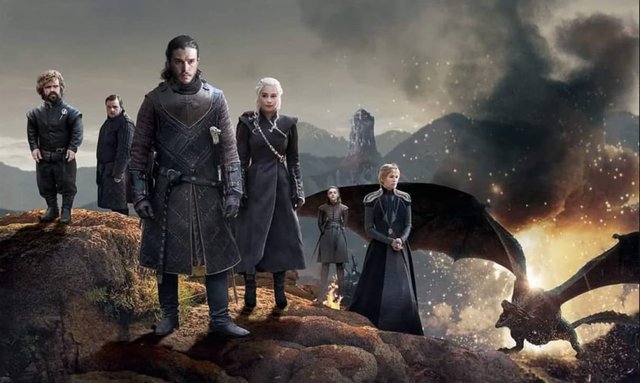
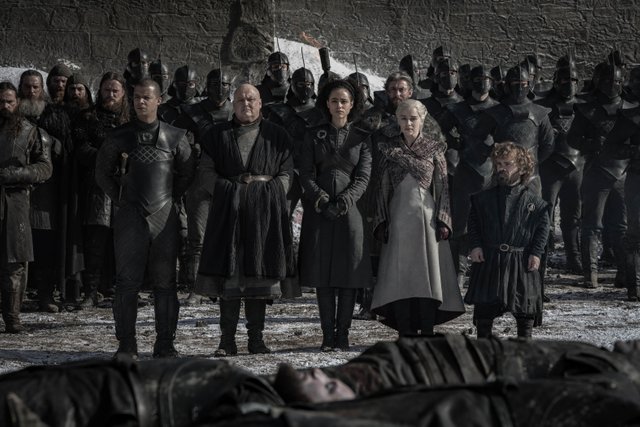
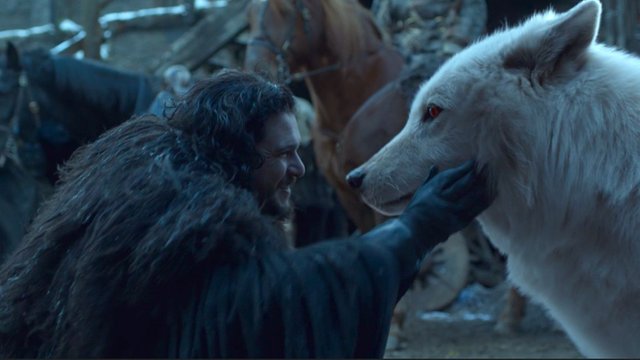
Great review. Unfortunately the writers did not put love at the end of the story, HBO offered them the opportunity to do 10 seasons with 10 episodes, and George had told them the events that would happen in the story, it is unacceptable the inconsistencies they made in the script. I will remember those first great seasons that captivated me so much.
Yes, they definitely can make more seasons but like I wrote I think they can't manage all the ideas which the author put in the novel.
Posted using Partiko iOS
Maybe, but anyway they could do something better, I think they were in a hurry to work in Star Wars.
We will never know. But it was a really good series, it isn't easy to please all the viewers and we definitely knew series that disappointed in last season because of lack of a good script or other reasons.